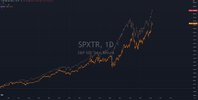CanOz
Home runs feel good, but base hits pay bills!
- Joined
- 11 July 2006
- Posts
- 11,543
- Reactions
- 519
Thanks CanOz. Yep, am trying to read up as much as possible and get educated, else it's just taking a punt.
Mate got me started on Investing and he's suggesting "Couch Potato Investing" but timing is everything for that and with the speed of how things move these days, I dunno if it's a good idea, however on that same note, BECAUSE of how the markets are, maybe that's the right approach?
Cheers,
Steve
Well if that's one thing that you could safely say will remain for a while its the volatility. The markets are moving fast and there is a certain psychology behind that I'm sure.
Half the battle is just finding something that you're comfortable with, that helps you pull the trigger. Whether that's Pattern trading, Elliot Wave, Gann, value investing, averaging down or whatever.
The deciding factor will always be the same thing...your winners need to be bigger than your losers or you need to win a heck of allot more than you lose.
Good luck!
CanOz


